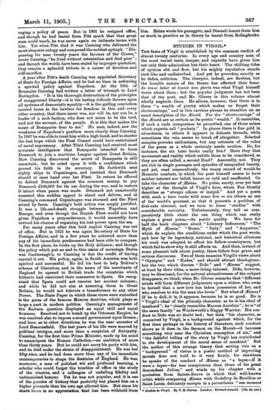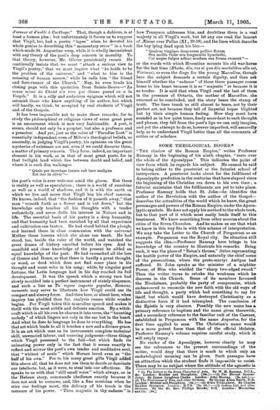STUDIES IN VIRGIL.*
THE fame of Virgil is established by the common verdict of almost twenty centuries. In every age and country men of the most varied taste, temper, and capacity have given him not only their admiration but their heart. The shifting tides of opinion ebb and flow, but his mighty reputation stands rock-like and undisturbed. And yet he provokes, exactly as he defies, criticism. The Georgics, indeed, are flawless, but the humble nature of the theme has affected their fame. In tenui labor at tenuis non gloria was what Virgil himself wrote about them ; but the popular judgment has not been that of the poet, and Mr. Glover in this volume almost wholly neglects them. He allows, however, that there is in them " a wealth of poetry which makes us forget their shortcomings," and in this careless phrase be stumbles on an exact description of the 2Eneid. For the " shortcomings" of the iEneid are as certain as its poetic " wealth." It resembles, if such a rude comparison be permitted, one of those mines which experts call " pockety." In places there is fine gold in abundance, in others it appears in delicate threads, while sometimes the vein seems to break off altogether. Selected samples provoke enthusiasm, but any estimate of the value of the poem as a whole certainly needs caution. Do, for instance, the six later books really live P Have they that movement and reality which entitle them to be considered, as they are often called, a second Iliad ? Assuredly, not. They are rich in single passages and episodes of unequalled beauty, and yet, read consecutively, the weary record of would-be Homeric combats, in which the poet himself seems to have neither interest nor belief, leaves us cold and unaffected. Or take the character of .news. No pulse, surely, ever yet beat higher at the thought of Virgil's hero, whom Fox bluntly describes as " always odious or insipid." And yet a poem with such a hero ranks with some five or six others as one of the world's greatest, so that it presents a problem of first-rate interest, and we turn to these " studies " with considerable curiosity. Unfortunately, they tell us com- paratively little about the one thing which can really explain a great poem,—its poetic. quality. We have for half the book chapters about " Literary Influences," "The Myth of 2Enea.s," "Rome," " Italy," and " Augustus," which do explain the conditions under which the poet wrote, and how by its legendary, national, and historical allusions his work was adapted to affect his fellow-countrymen, but which fail to show why it still affects us. And then, instead of some pleasant talk about poetry, there follow four grave and serious discourses. Two of them examine Virgil's views about " Olympus " and " Hades," and should attract theologians ; but the two which discuss " Dido " and " lEneas " suggest, at least by their titles, a more living interest. Dido, however, may be dismissed, for the natural attractiveness of the subject disappears, we think, when Mr. Glover remarks that "different minds will form different judgments upon a widow, who owns to herself that a new love has taken possession of her, and who resolves to win the man she loves." But what of .near ? If he is dull, it is, it appears, because he is so good. He is " Virgil's ideal of the princely character, as he is his ideal of manhood"; he " closely resembles Marcus Aurelius" ; be is " of the same family" as Wordsworth's Happy Warrior. His con- duct to Dido was no doubt bad ; but then "his character, as conceived by Virgil, is a background against which, for the first time perhaps in the history of literature, such conduct shows as it does in the Sermon on the Mount—it becomes something very near the Christian conception of sin," and "the faithful telling of the story by Virgil has contributed to the development of the moral sense of mankind." But the author of this strange theory that setting vice on a " background " of virtue is a poetic method of improving morals does not hold to it very firmly, for elsewhere be speaks of the conduct of hneas as " a lapse—if it were a lapse—far less conspicuous than those of his great descendant Julius," and winds up his chapter with a quotation from Sainte-Beuve in which that well-known critic, while comparing 2Eneas with Godefroy de Bouillon or Saint Louis, delicately excepts in a parenthesis "son moment d'erreur et d'oubli a Carthage." That, though a dubious, is at least a human plea ; but unfortunately it forces us to suppose that Virgil, too, had a poetic " lapse " when he devoted his whole genius to describing this " momentary error " in a book which made St. Augustine weep, while it is wholly inconsistent with any theory of the poet's deep concern in morality. To that theory, however, Mr. Glover persistently recurs. He continually insists that we must " attach a serious view to Virgil's poetry," that we must inquire what " he holds to be the problem of the universe," and " what to him is the meaning of human sorrow," while he calls him "the friend and fore-runner of the Church." Nay, he even heads his closing page with this quotation from Sainte-Beuve—"La venue nulme du Christ n'a rien qui etonne quand on a lu Vergile." It is a silly and audacious epigram which will not astonish those who know anything of its author, but which will hardly, we think, be accepted by real students of Virgil and of the Gospels.
It has been impossible not to make these remarks, for to study the philosophical or religious views of some great poet is an amusement which is now very fashionable. A poet, it seems, should not only be a prophet, but also a professor and a preacher. And yet, just as the value of "Paradise Lost" is essentially independent even of Milton's theological beliefs, so assuredly, in judging Virgil's poetry, his opinions on the great mysteries of existence are not, even if we could discover them, a matter of primary concern. They form, indeed, an important element in his work, as in that of most great poets, for in that twilight land which lies between doubt and belief, and where it is such dim walking- " Quale per incertam lunam sub ince maligns Est iter in silvis"—
the poet's voice is ever welcome amid the gloom. But there is reality as well as speculation ; there is a world of sunshine as well as a world of shadows, and it is with the earth on which we live and move that Virgil has his chief concern. He knows, indeed, that "the fashion of it passeth away," that man " cometh forth as a flower and is cut down," but the knowledge only touches all his thoughts with a tender melancholy, and never dulls his interest in Nature and in life. The essential basis of his poetry is a deep humanity, and that humanity had been enriched by all that experience and cultivation can bestow. He had stood behind the plough, and learned there in close communion with the universal Mother those lessons which she alone can teach. He had stood, too, beside the ruler of the world, and watched the great drama of history unrolled before his eyes. And to manifold and close knowledge of the present he added an equal knowledge of the past. He had ransacked all the lore of Greece and Rome, so that there is hardly a great thought, or word, or deed which does not find some place in his thought and some echo in his song ; while, by singular good fortune, the Latin language had in his day reached its full development. It was the speech which a strong race had slowly moulded into a perfect instrument of stately eloquence, and such a line as Tu regere irnperio populus, Romane, memento may serve to illustrate how Virgil could use its compact and sinewy force. And then here, or about here, when inquiry has plodded thus far, analysis ceases while wonder begins. For Virgil takes this masculine speech and makes it thrill with the most subtle and delicate emotion. By a witch- craft which is all his own he charms it into verse, the " haunting melody " of which lingers not only in the ear but in the heart. And what he does to language he does to everything. He has that art which lends to all it touches a new and a diviner grace. It is an art which uses as its instruments complete technical skill, unwearied labour, and unerring judgment—three things which Virgil possessed to the full—but which finds its animating power only in the fact that it seems exactly to reflect and mirror the poet's own tender and meditative soul, that " whitest of souls " which Horace loved even as " the half of his own." For to hie many great gifts Virgil added this above all, that he does not use them to dazzle or dominate our intellects, but, as it were, to steal into our affections. He speaks to us with that " still small voice " which always, as in the Hebrew story, commands obedience exactly because it does not seek to overawe, and, like a fine musician when he stirs our feelings most, the delicacy of his touch is the measure of his power. " Thou majestic in thy sadness" is
and Co. [sal
how Tennyson addresses him, and doubtless there is a real majesty in all Virgil's work, but let any one read the lament of 2Eneas over Pallas (XI., 39-58), and the lines which describe the boy lying dead upon his bier-
" Qualem virgineo demessum pollice florem
Seu mollis violas seu languentis hyacinthi, Cui neque fulgor adhuc necdum sus forma recessit"—
or the words with which Mezentius mounts his old war-horse for the last time (Rkcebe, diu, res si qua diu mortalibus ulla est, Vizimus), or even the dirge for the young Marcellus, though here the subject demands a certain dignity, and then ask himself whether the " sadness " of these three passages comes home to his heart because it is so " majestic " or because it is so tender. It is said that when Virgil read the last of them in the presence of Octavia, the mother of Marceline, she swooned as he concluded, and the story bears the stamp of truth. The lines touch us still almost to tears, not by their perfect art, not because they tell of Imperial hopes blighted but by their simple human feeling. How they must have sounded as in low quiet tones, finely accordant to each thought and phrase, they fell from the poet's lips we can only imagine, and yet the attempt to do so, however imperfect, will assuredly help us to understand Virgil better than all the comments of critics or of scholars.











































 Previous page
Previous page